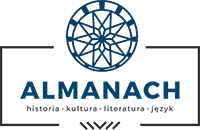Professor Ananiasz Zajączkowski’s Research on the Folklore of the Polish-Lithuanian Karaites
Piotr Muchowski
Piotr.Muchowski@amu.edu.plDepartment of Asian Studies, Adam Mickiewicz University (Poland)
Abstract
This article deals with Professor Ananiasz Zajączkowski’s work on the folklore of the Polish-Lithuanian Karaites before the First World War. Ananiasz Zajączkowski authored several articles in which he edited and/or described manuscripts in the Karaite language. These manuscripts, which included works on fortune-telling, magic and herbalism, originated in late 19th-century Lithuania. The article describes the genesis of works on Karaite folklore and challenges Ananiasz Zajączkowski’s thesis regarding the origins of the Turkic peoples. It quotes a number of Hebrew manuscripts kept in Karaite collections and proves that most of the works have been translated into the Karaite language.
Keywords:
Ananiasz Zajączkowski, Karaite folklor, literature of the Polish-Lithuanian KaraitesReferences
References
Aharon ben Elijjahu z Nikomedii, Sefer Keter Tora, Komentarz do Księgi Wyjścia (w wydaniu z Gözleve 1867 fol. 21 verso) Google Scholar
Elijjahu Basziaczi, Sefer ham-Micwot han-Niqra Adderet Elijjahu, Injan Awoda Zara (Sprawa Bałwochwalstwa), rozdz. 2 (edycja z Gözleve 1834: fol. 52 recto). Google Scholar
Jehuda Hadassi, Sefer Eszkol hak¬-Kofer, rozdz. 103 (w wydaniu z Gözleve 1836 fol. 43 recto) Google Scholar
Kizilov, Mikhail, The Karaites of Galicia. An Ethnoreligious Minority among the Ashkenazim, the Turks, and the Slavs, 1772–1945. Leiden, Boston 2009. Google Scholar
Mann Jacob, Texts and Studies in Jewish History and Literature. Vol. 2: Karaitica. New York 1972. Google Scholar
Muchowski, Piotr, Folk Literature of the Polish-Lithuanian Karaites: Abkowicz 3 Manuscript, Part 2, Paris 2013. Google Scholar
Sulimowicz, Anna, Prace prof. A. Zajączkowskiego poświęcone historii i kulturze Karaimów, [w:] H. Kobeckaitė, T. Bairašauskaitė (red.). Kipčiakų tiurkų Orientas Lietuvoje: istorija ir tyrimų perspektyva: tarptautinės mokslinės konferencijos, skirtos profesoriaus dr. Ananiaszo Zajączkowskio 90-sioms gimimo metinėms, medžiaga, Vilnius, 1993 m. spalio 14–15 d., Vilnius 1994. Google Scholar
Zajączkowski, Ananiasz, Karaimi na Wołyniu. Osobne odbicie z „Rocznika Wołyńskiego” tom III, Równe 1933 (Nakładem Zarządu Wołyńskiego Okręgu Związku Nauczycielstwa Polskiego). Google Scholar
Zajączkowski, Ananiasz,, Karaims in Poland: History, Language, Folklore, Science, La Haye-Paris 1961. Google Scholar
Zajączkowski, Ananiasz,, Tatarsko-karaimskie piosenki ludowe z Krymu (t. zw. čyŋ), „Rocznik Orienta-listyczny”, t. 14 (1938). Google Scholar
Zajączkowski, Ananiasz,, Teksty i studia folklorystyczne. I. Wykładanie snów. II. Lecznictwo ludowe, „Myśl Karaimska”, z. 12 (1938). Google Scholar
Zajączkowski, Ananiasz,, Wróżby z drgania części ciała (sekirme jorałary), „Myśl Karaimska”, t. 2 z. 1 (1929). Google Scholar
Zajączkowski, Ananiasz,, Wróżby z drgania części ciała (sekirme jorałary), „Myśl Karaimska”, t. 2, z. 1 (1929). Google Scholar
Zajączkowski, Ananiasz,, Z dziejów literatury wróżbiarskiej. (I. „Objaśnienia drgań” części ciała, II. „Księga losów”), „Myśl Karaimska” z. 11 (1935-1936). Google Scholar
Authors
Piotr MuchowskiPiotr.Muchowski@amu.edu.pl
Department of Asian Studies, Adam Mickiewicz University Poland
Doktor habilitowany, kierownik Katedry Studiów Azjatyckich w Uniwersytecie Adama Mickiewicza w Poznaniu. Absolwent filologii hebrajskiej w Instytucie Orientalistycznym Uniwersytetu Warszawskiego. Zajmuje się badaniami nad historią języka hebrajskiego, literaturą hebrajską okresu pobiblijnego oraz hebrajską literaturą Karaimów polskich. Jest autorem m.in. książek poświęconych zwojom z Pustyni Judzkiej Komentarze do rękopisów znad Morza Martwego (Poznań 2005) oraz Hebrajski qumrański jako język mówiony (Poznań 2001) a także oraz książki poświęconej rękopisom karaimskim Folk literature of the Polish-Lithuanian Karaites. Abkowicz 3 manuscript (Paryż 2013). Prowadzi zajęcia z literatury hebrajskiej (aszkenazyjskiej i karaimskiej), z judaizmu oraz seminaria licencjackie z zakresu językoznawstwa i literaturoznawstwa.
Statistics
Abstract views: 153PDF downloads: 100
License
Authors
Authors of texts accepted for publication in Karaim Almanac are required to complete, sign and return to the Editorial team’s office the Agreement for granting a royalty-free license to works with a commitment to grant a CC sub-license.
Under the agreement, the authors of the texts published in Karaim Almanac grant Polish Karaim Association a non-exclusive, royalty-free license and authorize the use of Attribution-NoDerivatives 4.0 International (CC BY-ND 4.0) Creative Commons sub-license.
The authors retain the right to the free disposal of the work.
Users
Interested Internet users are entitled to use works that have been published in Karaim Almanac since 2018, under the following conditions:
▪ attribution – obligation to provide, together with the distributed work, information about the authorship, title, source (link to the original work) and the license itself.
▪ no derivatives – the work must be preserved in its original form. Without the author's consent, it is not possible to distribute the modified work in the form of translations, publications, etc.
Copyrights are reserved for all texts published before 2018.
Miscellaneous
Polish Karaim Association retains the property right as a whole (layout, graphic form, title, cover design, logo etc.).
Privacy statement
The names and email addresses published on this journal site will be used exclusively for the purposes declared by this journal and cannot be used for any other purpose or by any other party.


